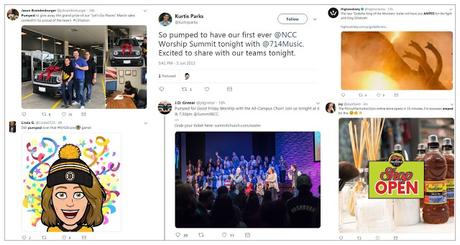"Pumped" "Juiced" "Excited" "Amped"
The above are words by pastors you read on Facebook or Twitter or Church Web pages who try to artificially intensify an upcoming Sunday/Good Friday/Easter church service. Not everything is a party.
In fact, the commands in the Bible for how to live and how to worship use words that declare the opposite. We are called to be holy, sober-minded, dignified, reverent, self-controlled, and more.
Not that we don't get excited for worship, or that we shouldn't declare our heightened emotions at a wedding or an Easter service or a conference or a Choir performance etc. But to use juvenile language to constantly artificially promote reverent services is well, juvenile. It's especially silly language if coming from 40 and 50 year olds. Church services are not a circus, a performance, a festival, or a sports game, but using the same language that mimics those other more fleshly pursuits diminishes the dignity of a church service.
See how the juvenile excitement language is used for a car giveaway, a movie release, a grocery store opening, a hockey game, and a....worship service?

The Bible says we are to prepare for services this way:
Therefore, preparing your minds for action, and being sober-minded, set your hope fully on the grace that will be brought to you at the revelation of Jesus Christ. (1 Peter 1:13).
The phrase "set" your hope indicates an intentionality of action for living and for worshiping. That intentionality should include a sober-mindedness (meaning, no silliness). It's a sober-minded decision to reverently consider and declare the wonders of our Savior.
Ascribe to the Lord the glory due his name; bring an offering and come before him! Worship the Lord in the splendor of holiness; (1 Chronicles 16:29)
I listened to a fascinating Q&A conversation between Dr. Austin Duncan and Dr. John MacArthur on ecclesiology, the study of the church. It's here.
Duncan asked MacArthur why he programs his Sunday services the way he does, the order of what occurs and if it has always been that way. MacArthur replied that when he came to Grace Community Church 50 years ago, the order of service had been different, but he instituted this order for certain reverential and particular reasons.
Invocational prayer, sometimes aloud led by a pastor, sometimes silent..
Reason: Refocus the congregation's attention from fellowship to the Lord for worship.
Series of songs
This is also a call to worship, now for the purpose of bringing people to the presence of the Lord. The congregation "sings our salvation joys back to Him." Singing songs that extol His grace and mercy and salvation. Again focuses attention to the Lord and giving Him glory.
Read scripture
Reason: To hear from Him. We hear from Him through His word. MacArthur reads a lengthy portion. Scripture carries divine power. It is read carefully and soberly.
Choral Prayer
Reason: To ask the Lord, please receive our worship and our praise. Now it's a united community prepared to hear the words of the scripture.
MacArthur now acts as priest, bringing the congregation into the presence of the Lord in communion
Brief intro visitors, announcements
Reason: Because, lol, "this is still real life."
Offering
Giving is part of worship
Song
Reason: More expressions of our praise
Sermon, 1 hour
Now the pastor switches from acting as priest bringing the people to the Lord, to prophet bringing the Lord to the people, through His word.
Song or benediction
MacArthur emphasized that of course this not the only way to conduct a service, but it seems to him to be a good and dignified way that honors the Lord.
He also said that there is a cultural issue involved in how people approach church services. Increasingly, he said he has observed that people in their entire lives have never attended a sober event. They don't know how to act. They simply don't know how to act. They don't know how to be serious when the event or the situation calls for dignity or seriousness. But church services need to "have a loftiness and a dignity," he said.
"Seriousness, sober-mindedness,and dignity is something this generation desperately needs. This hyper-casual generation...the manifest irresponsibility they demonstrate in life by the way they dress and the way they act shows a lack of discipline. They may be able to discipline themselves at the gym, but they have a very difficult time disciplining their minds." ~John MacArthurNow, that is the crux of the matter right there. I'm not a fuddy duddy, complaining for kids to get off my lawn and to bring back only 'traditional' services. There are two issues, one I've mentioned: a lack of sober-mindedness in the way so many church leaders and congregants approach their services. What they say (i.e. 'pumped'), how they dress, and how they act displays a lack of dignity, and thus reverence, in worshiping the Holy God.
Secondly, pastors who pander to this hyper-casualness fail to teach how to BE sober-minded and dignified to a generation that desperately needs it. As MacArthur said in the Q&A, if you can't get them to sit there for an hour and a half without some sort of frivolity, they aren't going to go through life pursuing holiness.
An undisciplined mind will succumb to the world, fizzle in its walk, and short-circuit its sanctification. That's why being "pumped" for church services is far from the same as one who soberly prepares, contemplates, and rigorously disciplines their mind to receive truth- and reject sin.
Are we soldiers on a mission? Or are we puerile party goers so "pumped" that we can't tell the difference in how to behave in a church service or a frat party?
